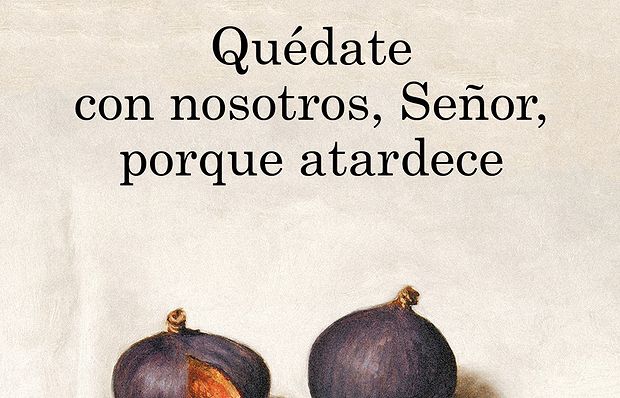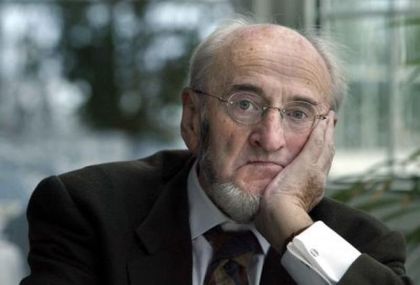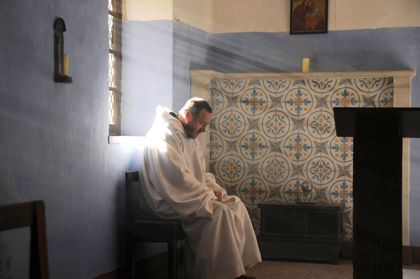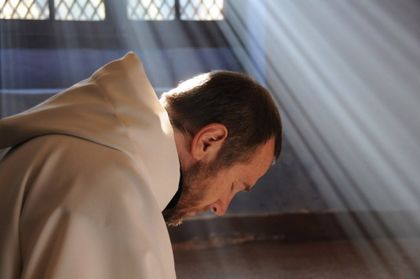“We not only don’t seek God, we don’t seek anything”, said Álvaro Pombo in relation to his book Quédate con nosotros, Señor, porque atardece (Stay with us, Lord, for it is nearly evening).
 The book cover.
The book cover.
“Nowadays, we not only don’t seek God, we don’t seek anything”, Álvaro Pompo said at the presentation of his book Quédate con nosotros, Señor, porque atardece (Stay with us, Lord, for it is nearly evening). These words, taken from the account of the journey to Emmaus in the Gospel according to Luke, are like a prayer by someone seeing that “age is difficult, because it makes you face up to what you are”.
Pombo is a popular author who has won various prizes including the Spanish Herralde, Planeta and Nadal prizes, but he always swims against the current. He is extemporaneous, not concerned by the concerns of the majority, although he is nevertheless a militant of the Union, Progress and Democracy party – however, here he also seems to act as a lone wolf–.
 Pombo, the author.
Pombo, the author. He is one of the few Spanish writers who declares himself a Christian, albeit an unorthodox one. He is homosexual, but against the gay movement and gay marriage. He tends to say strange things that people don’t understand. He bewilders many, but it does not seem to bother him. He is contradictory and in his own world, but always true to himself.
Pombo is from Santander but went to study philosophy in London and Madrid, where we have been neighbours for some time. He now lives alone and he recently turned 76 – a few days after my own birthday, on 23 June –. We sometimes meet at our local newsstand, where he – as I – buys all kinds of newspapers, regardless of ideology or political interests.
CATHOLIC NOVEL?
“When I was a child I started to believe the things that were believed at that time – he says–. But there was a before and an awakening from the dream by the operation of supernatural faith”. No one should be surprised by this novel – which he describes as “catholic” –, because he says that “I have always declared publicly that I have been baptized and that I am a Christian”. Although he says that: “I am now examining my beliefs in a new light”.
The book tells the story of the creation of a Trappist community in the province of Granada in the early 1960s, when “communes and the diffused spirituality of 1968 were omnipresent, somewhat influenced by the flower children movement and oriental philosophy, which was not always entirely understood”. The community stands 200 metres down the road from a country house owned by the evangelical association Betel, which runs rehabilitation centres, where the monks also try to help by chatting to the drug addicts.
 Pombo explains the story of the creation of a Trappist community.
Pombo explains the story of the creation of a Trappist community.The prior is from Madrid and was a student in the 1950s when Spain saw the “emergence of Opus Dei and the likes of Kiko Arguello (who co-founded the Neocatechumenal Way movement) seeking heaven and the reconquest of the temporal world for Jesus”. It was “the time of lay theology, of the father Congar, of the Little Brothers of Jesus, worker-priests and enthusiasm for preconciliar (Vatican II) liturgy, when poets such as Valverde and Panero, and philosophers like Zubiri were read”.
THE LONG SILENCE
A recent German documentary about a group of Swiss Carthusians films men seeking “the long silence, the long purgative night in which God, in some way, reveals himself through the emptying of the self that leads to a deeper self than we have ever encountered”. It is, ultimately, a path to introspection.
In these internal twists and turns, it is not uncommon for God to sometimes become “an innocuous reference, a quotable quote, a non-entity, a non being, a mere edifying phrase that goes soggy when bereft of gravity, pain, patience and the work of suffering”. This could be applied so many forms of mysticism.
A comparison is drawn with Kafka’s “The Castle”, where the surveyor is not able to talk to the castle official. This is what we often find with our own solitude and silence. The attraction of the convent, however, is not just an escape from the world, but a path to holiness. They do not consider themselves to be pure and perfect, or wish to appear better than anyone else, but they seek to achieve the goodness derived from grace that unconsciously makes people forget themselves.
TRIAL BY MEDIA
These are not good times for monastic life. There are only six monks and then one of them goes and hangs himself. The prior decides to conceal the facts and act as if it had all been an accident. The problem is that one of his former colleague becomes a renowned journalist and suspects that it was in fact a case of suicide, comparing the convent to some kind of sect.
This well-known figure is critical rather than auto-critical. All his questions are loaded; his interviews only seek to confirm that which he has always believed. He proceeds to berate these friars, whom he describes as being “haunted by neuroses, compulsive obsessions and feelings of failure”. As far as he is concerned, religious experience is nothing more than a “divine mirage”.
His conflict with the community escalates to violence, on both sides. Humiliation makes them “aware of their own insignificance and stupidity”, making them “feel minuscule, like cockroaches”. He thus echoes Teresa of Ávila’s words when she observed that mystical experiences did not necessarily imply a state of grace, and could often, to the contrary, be harmful and dangerous.
DOUBTS ABOUT FAITH
Abel realizes that “believing in God and conscientiously fulfilling his monastic duties did not illuminate him; the divine objective continued to be as obscure as ever before, but it gave some kind of sense to his life”. It “helped him to live in a world that appeared ordered on the outside, where he knew the rules off by heart and could observe them with exactitude”. The problem is that “the less I said and the more I tried to be like the person that everyone knew me as, the less capable I felt of believing my own prayers”.
His intentional death is a declaration of the truth that he has always avoided, that “man is born for death”, a death which is absurd because we “die for nothing” – as he confesses to the woman that he accompanies to meet the countess who has donated the community house–. While he doubts God’s existence, he has chosen “dogma, the church, submission and abnegation”, to “transcend this existence”, thus becoming a good ascetic.
“I started to resemble what I was not, seeming better than I was or more fulfilled than I felt myself to be: people would increasingly look up to me, as I became diminished before God and in my own eyes because the seeds of true love were not planted in me, only arrogance and impatience”. The honesty of this man awakens our sympathy, compared with the violence of Raimundo, whose anger explodes just when he thinks that he has managed to control it, underestimating the power of the desires and impulses of the flesh. However, in the end, even he appears so pathetic that we feel compassion for him.
A PRAYER
A key to understanding this novel – as Pombo has said – is seeing it as a prayer. The book begins with the apostolic calling “The hour has already come for you to wake up from your slumber…The night is nearly over; the day is almost here.” (Romans 12: 11-12), and it ends with the words of Psalm 88 (87 in catholic Bibles). Desperation can even lead a sceptic to convert, in a surprising outcome.
 Key to understand the book, says Pombo, is to see it as a prayer.
Key to understand the book, says Pombo, is to see it as a prayer.The main question raised by this book is whether religious life is possible outside the structure of the church, opposing individual to institutional prayer, the praying church and the politicized one. Echoing Henri de Lubac, Pombo wonders whether “the need to maintain order imposes a human governmental structure on the church that has nothing to do with the holiness of the gospel”. Accordingly, “it appears that the Vatican church, external Christianity, is less fundamental and authentic than inner spirituality”. It is “a human creation”, while “inner Christianity is truer and deeper”.
In Pombo’s view, however, “it is impossible to believe in a vacuum”. He attributes to Calvin the idea that the Church can survive without a visible form. Even the sceptic character rejects Lutheranism, which he thinks is “asking the impossible”. Whatever our view is of Protestantism, there is no doubt that the Bible gives us a realistic reading of life. It does not try to camouflage difficulties, or make light of problems. Prayer in Scripture is not an excuse for not thinking, trying to dodge a problem or situation. Christians should see things as they are but not become resigned.
THE CHRISTIAN AND THE WORLD
For centuries, Christians have tried to abandon the world, trying to separate themselves from society. They presented religious life as an alternative to loving the world (1 John 2:15), as if the world wasn’t also to be found in their monasteries and convents. Evangelicals have also tried to create a subculture to free themselves of the world’s temptation and seduction. This has led many to give up entertainment, politics and social activities, but what is the world according to John?
The world is not, in this case, the natural creation of the physical world, or marriage and family, work or business, governments or politics. The world is life that excludes God; legitimate but uncontrolled desires, and false values, on the basis of which we judge by appearance. It is self-aggrandizement, reflecting “the pride of life” (v. 16); the ambition for success, even if that success is religious. This is what Christianity rejects but why?
Because it means rejecting a love much stronger than the love offered by the world: “the love of the Father” (v. 15). It means rejecting the life of Christ, who rejected display and appearances, being peaceful and humble. Known as the friend of the corrupt and of prostitutes, Jesus was misunderstood. Christians should not glory in anything but the cross of Christ (Galatians 6:14).
The world that we need to reject, is that passing and short-lived reality (1 John 2:17), which makes us live as if it was the only possible reality. The honour that we seek is not that of men, but that of being recognized by God when he says: “Well done, good and faithful servant!…Come and share your master’s happiness!” (Matthew 25:21). That is why we say with Pombo that “between now and the hour of death there is nothing as significant as the name of God”.

Las opiniones vertidas por nuestros colaboradores se realizan a nivel personal, pudiendo coincidir o no con la postura de la dirección de Protestante Digital.
Si quieres comentar o